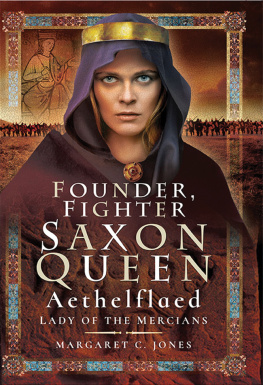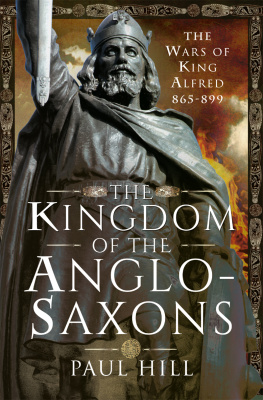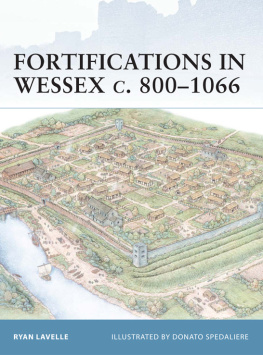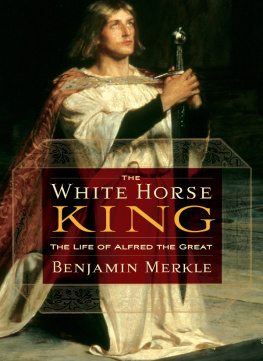ACKNOWLEDGMENTS
a nyone who writes a biography of Alfred the Great owes a debt, whether acknowledged or not, to Asser, the Welsh priest who was the kings Latin teacher and the first chronicler of his life, to the anonymous authors of the Anglo-Saxon Chronicle, and to four twentieth century scholars whose contributions to our knowledge of the first Englishmen are incalculableSir Frank Stenton, R. H. Hodgkin, Dorothy Whitelock, and Peter Hunter Blair.
Elsewhere in this volume my indebtedness to numerous others who have written about Alfred and his times is acknowledged at appropriate places in the narrative. I have searched the writings of eleven centuries in four languages, drawing light from many sources to illuminate the king and the scene of his labors.
Very direct personal appreciation is due two colleagues at Old Dominion University, Professor Guy T. Holladay of the Department of Foreign Languages, for help in translating difficult passages of German, and Professor David L. Shores, of the English Department, whose expertise in Old English made his services as a proofreader particularly valuable. I am grateful also to two members of the staff of the Hughes Library of Old Dominion University, Professor Benjamin F. Clymer, head of the reference department, and his assistant Rebecca M. Tabakin, interlibrary loan librarian, for their resourcefulness and indefatigable efforts in obtaining research materials. Special thanks go to Professor F. Anne Payne, of the State University of New York at Buffalo, one of the greatest living authorities on the writings of Alfred, whose proofreading was as valuable as her corroborative judgment on many points was reassuring.
On the publication of this, my fifth book, retrospection also compels other acknowledgments: to my mother, Lorraine Carney Mapp, who first taught me how the English language could sing; to my maternal grandmother, Irene Dunaway Carney, who awakened the creative impulse in me and was my first amanuensis; to my father, Alf Johnson Mapp, my first and most helpful critic, a direct descendant of Alfred, who like his famous ancestor, served education with imagination and wit, was resourceful in large things and small, could write an essay or plan a building with equal facility, and met life with courage and candor. Grateful remembrance, too, sheds a special luster on the late Douglas Southall Freeman, often called Americas greatest biographer, who encouraged me to write my first book.
But one person, above all, deserves thanks for help with The Golden Dragon, as in so many things. My wife, Ramona Hartley Mapp, first suggested that I write a book about Alfred the Great, a character who had intrigued me since childhood. She typed and proofread the manuscript. A former teacher of English at Old Dominion University and at Tidewater Community College, Portsmouth, Virginia, and now chairman of the Division of Humanities and Social Sciences at the latter institution, she provided an informed critical judgment as well as a generously appreciative audience for the testing of alternatives at every stage of my writing. In walks through the woods at our country place on the Corotoman River, in earnest conversations in the study of our Portsmouth home, and by the glow of a log fire while I sought to reproduce the play of firelight on the walls of a Saxon palace, she shared the trials and the joys of my creation. It is simple justice, as well as my great privilege, that this book should be dedicated to her.
ALF J. MAPP JR.
Portsmouth, Virginia
April 19, 1974
APPENDICES
ALFREDS LAW
Now I, King Alfred, have collected these laws, and have given orders for copies to be made of many of those which our predecessors observed and which I myself approved of. But many of those I did not approve of I have annulled, by the advice of my councillors, while [in other cases] I have ordered changes to be introduced. For I have not dared to presume to set down in writing many of my own, for I cannot tell what [innovations of mine] will meet with the approval of our successors. But those which were the most just of the laws I foundwhether they dated from the time of Ine my kinsman, or of Offa, king of the Mercians, or of AEthelberht, who was the first [king] to be baptised in Englandthese I have collected while rejecting the others.
I, then, Alfred, King of the West Saxons, have shewn these to all my councillors, and they have declared that it met with the approval of all, that they should be observed.
In the first place we enjoin you, as a matter of supreme importance, that every man shall abide carefully by his oath and his pledge.
1. If anyone is wrongfully constrained to promise either of these: to betray his lord or to render aid in an unlawful undertaking, then it is better to be false [to the promise] than to perform it.
2. If, however, he pledges himself to something which it is lawful to carry out and proves false to his pledge, he shall humbly give his weapons and possessions to his friends to keep, and remain 40 days in prison at a royal manor, and undergo there whatever [sentence] the bishop prescribes for him; and his relatives shall feed him if he himself has no food.
3. If he has no relatives, and [if he] has not the [necessary] food, the kings reeve shall provide him with it.
4. If he will not submit unless force is used against him, [i.e.] if he has to be bound, he shall forfeit his weapons and his property.
5. If he is slain, no wergeld shall be paid for him.
6. If he runs away before the term [of imprisonment is completed] and is recaptured, he shall remain in prison 40 days, as he ought to have done at first.
7. If he succeeds in making his escape, he shall be banished, and excommunicated from all the churches of Christ.
8. If, however, other men stand surety for him, he shall pay the compensation [due to them] for violation of bail, as the law directs him, and the compensation for breach of faith, as his confessor prescribes for him.
- If a man flees, for any manner of offence, to any monastery which is entitled to receive the kings food, rent, or to any other free community which is endowed, for the space of three days he shall have right of asylum, unless he is willing to come to terms [with his enemy].
1. If, during that time, anyone injures him by a [mortal] blow, [by putting him in] fetters, or by wounding him, he shall pay compensation for each of these offences in the regular way, both with wergeld and fine, and he shall pay 120 shillings to the community as compensation for violation of the sanctuary of the Church, and he [himself] shall not have the payment due to him from the fugitive.
- If anyone violates the kings protection, he shall pay compensation for the crime [to the injured person], as the law directs him, and 5 pounds of pure silver pennies for violation of the kings protection; for violation of the archbishops protection or guardianship 3 pounds must be paid as compensation; for violation of the protection or the guardianship of any other bishop or of an ealdorman 2 pounds must be paid as compensation.
- If anyone plots against the life of the king, either on his own account, or by harbouring outlaws, or men belonging to [the king] himself, he shall forfeit his life and all he possesses.
1. If he wishes to clear himself [from such a charge), he shall do it by an oath equal to the kings wergeld.
2. And likewise with regard to all classes, both commoners and nobles, we ordain; he who plots against the life of his lord shall forfeit his life to him, and all he possesses, or he shall clear himself by [an oath equal to] his lords wergeld.
- Further, we grant to every church consecrated by a bishop this right of sanctuary: if a man, attacked by enemies, reaches it either on foot or on horseback, he shall not be dragged out for seven days, if he can live despite hunger, and unless he [himself comes] out [and] fights. If, however, anyone does try to drag him out, he shall forfeit the amount due for violation of the kings guardianship and the fine for violating the sanctuary of the churchand a greater amount if he seizes more than one person in such a place.










